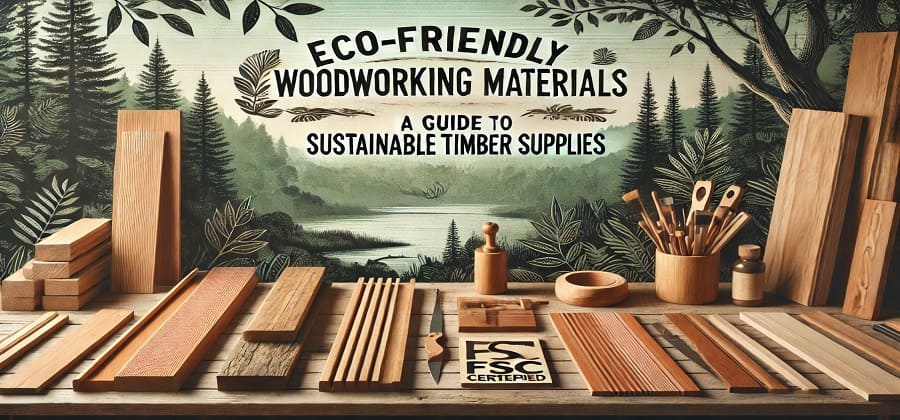Woodworking is an age-old craft that has evolved with time, integrating new techniques and materials to ensure sustainability. Today, eco-conscious woodworkers are looking for sustainable solutions that minimize environmental impact without compromising on quality. If you’re searching for the best woodworking supplies store or want to buy woodworking supplies online, it’s essential to understand what makes a material eco-friendly. This guide will explore the best sustainable woodworking materials and how to source them responsibly from trusted woodworking timber supplies providers.
Understanding Sustainable Woodworking Materials
Sustainability in woodworking means using materials that are harvested responsibly, processed with minimal environmental impact, and sourced from renewable or recycled materials. The key factors that define sustainable woodworking materials include:
- Renewability: The material should come from fast-growing trees or managed forests where new trees are planted to replace harvested ones.
- Certifications: Recognized certifications such as FSC (Forest Stewardship Council) and PEFC (Programme for the Endorsement of Forest Certification) ensure ethical harvesting practices.
- Low Emissions: Materials with low volatile organic compounds (VOCs) help maintain indoor air quality.
- Recycled or Reclaimed Wood: Using salvaged wood reduces deforestation and waste.
Best Sustainable Wood Options for Woodworking
When browsing a woodworking supplies store or shopping for woodworking supplies online, consider these sustainable timber options:
1. Bamboo
Bamboo is a highly sustainable material due to its rapid growth rate. Unlike traditional hardwoods, which can take decades to mature, bamboo reaches harvestable size in just a few years. Its strength and durability make it an excellent choice for furniture, flooring, and decorative elements.
2. Reclaimed Wood
Reclaimed wood is salvaged from old buildings, barns, and factories. Using reclaimed wood minimizes waste and gives old materials a second life, reducing the need for new logging. It adds character and history to woodworking projects while promoting sustainability.
3. Cork
Cork is harvested from the bark of cork oak trees without harming the tree itself. It is lightweight, water-resistant, and an excellent choice for acoustic panels, flooring, and furniture details.
4. FSC-Certified Hardwoods
Hardwoods such as oak, maple, and cherry can be sustainable when sourced from FSC-certified forests. These certifications ensure that timber is harvested responsibly, maintaining biodiversity and ecosystem health.
5. Engineered Wood Products
Materials like plywood, MDF (Medium Density Fiberboard), and OSB (Oriented Strand Board) can be sustainable when made with eco-friendly adhesives and sourced from responsibly managed forests. These materials reduce waste by using wood chips and fibers that would otherwise go to landfills.
Where to Buy Sustainable Woodworking Materials
Finding a reliable woodworking supplies store or purchasing woodworking supplies online can be overwhelming, but the following sources offer sustainable options:
Local Lumber Yards
Visiting a local lumber yard allows you to inspect the quality of the wood and ensure it meets sustainability standards. Many yards now stock FSC-certified and reclaimed wood options.
Online Woodworking Supplies Stores
Shopping for woodworking supplies online gives access to a broader range of materials, often with detailed sustainability information. Look for retailers that specialize in eco-friendly timber.
Specialized Sustainable Timber Suppliers
Several companies focus exclusively on eco-friendly woodworking timber supplies. These businesses ensure ethical sourcing, often providing certifications and background information on the wood’s origin.
Benefits of Using Sustainable Woodworking Materials
Choosing eco-friendly woodworking materials has numerous advantages, both for the environment and your woodworking projects:
- Reduces Deforestation: Opting for sustainably sourced wood helps prevent deforestation and supports forest regeneration efforts.
- Promotes Healthier Indoor Air Quality: Low-VOC wood and adhesives reduce indoor air pollution, creating a safer environment.
- Enhances Project Longevity: Sustainable materials are often more durable and of higher quality, ensuring longevity.
- Supports Ethical Practices: Purchasing from responsible woodworking supplies stores contributes to fair trade and ethical labor practices.
Tips for Sustainable Woodworking Practices
Aside from choosing eco-friendly woodworking timber supplies, adopting sustainable practices in your workshop can further reduce your environmental footprint:
- Use Non-Toxic Finishes: Opt for natural oils and water-based finishes instead of chemical-heavy varnishes.
- Minimize Waste: Plan your cuts efficiently and repurpose offcuts for smaller projects or decorative elements.
- Invest in Quality Tools: Durable tools reduce waste and provide precision, minimizing material loss.
- Recycle and Upcycle: Instead of discarding scraps, consider using them for smaller crafts or donating them to schools and community projects.
Conclusion
Sustainable woodworking is more than just a trend—it’s a responsibility. Whether you source materials from a woodworking supplies store or purchase woodworking supplies online, prioritizing eco-friendly woodworking materials ensures that your craft is both high-quality and environmentally responsible. By choosing FSC-certified timber, reclaimed wood, or innovative materials like bamboo and cork, you can create stunning woodworking projects while supporting a greener future.
As awareness of sustainability grows, more woodworking timber supplies providers are embracing ethical practices. By making informed choices, you can contribute to a healthier planet while crafting beautiful, lasting pieces. Happy woodworking!






